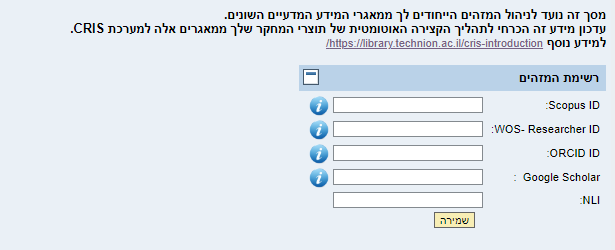Academic Identifiers
What are academic identifiers, where to find them, and why you should add them to your SAP
Academic Identifiers provide unique identification numbers for each author, which improves the visibility of your research, helps in locating specific authors, and in preventing mistakes when identifying researchers (for example: with common names). The most common identifiers for the CRIS system are Scopus ID and ORCID ID.
The research publications that appear in the CRIS system are automatically collected from the Scopus and IHP databases, based on the updated academic identifiers in the system. Adding and updating your researcher identifiers in CRIS is done by updating your identifiers in the SAP system.

3 reasons to update your IDs in SAP and improve your visibility and research impact:
- An updated academic identifier will ensure that all the publications on your CRIS profile are automatically synced with Scopus and IHP (plus, the data will be up to date)
- Your publications list on CRIS syncs with different databases according to your academic identifiers: with a Scopus ID number, your CRIS will sync with Scopus. With an ORCID ID your publications will sync with the IHP (Index to Hebrew Periodicals) database. You can, of course, add both your IDs to sync with both (recommended)
- Academic identifiers provide a unique identification number for each author, which improves the visibility of your research, helps in locating specific authors, and helps in preventing mistakes.
We would love to hear from you
The Technion libraries are here to assist you with research, teaching and studying.
We are happy to help with any question or request. Please send us your comments and suggestions for the newsletter in the form.
Any feedback is welcomed and will help us create more relevant and up-to-date content for you.
2024 \ Issue #10 \ Writing, editing and graphic design: Reference & Instruction team (Lior Porat, Ella Bogillo, Karen Dabran & Inbar Dekel-Levinzon)

